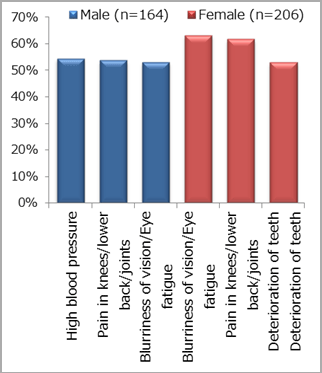Report 8-Japanese seniors’ health perceptions

Analysts: Miki Omagari and Mamiko Abe, Healthcare Industry Division, INTAGE Inc.
Overview
- Declining birthrate results in an increase in medical expenses and movement towards self-care.
- One in four people is over 65.
- Majority of people in their 70s care about food and exercise for the sake of their health.
- Most people in their 70s experience "pain in knees/lower back/joints".
Analysis
One in four people is over 65
It is relatively well-known that Japanese people have a long average life expectancy (80 years for males and 86 years for females in 2012 *1), but the declining birth rate (resulting in a juvenile (0-14 y/o) population of 13%) has also contributed to the fact that seniors (aged 65 and over) now comprise more than 25% of the population *2. Japan has become the first country with a graying society and declining birthrate, and as such the maintenance of economic vitality in the coming years is a matter of great urgency.
With the universal public health care system, half of the health benefits received by the elderly (aged 75 and over) are covered by taxes; thus, as the aged population grows, medical expenses place an increasingly heavy burden on government finances. From April 2014, out-of-pocket medical expenses for people over 70 were raised, and the consumption tax was also raised for the first time in 17 years (5%→8%), as not only seniors but the entire population is being enlisted in efforts to maintain a stable social security system. A wide variety of measures, such as redefining the meaning of "senior" itself by raising the age of eligibility for national pension payments, are being considered and implemented.
This also means that a greater degree of "self-care" and "self-medication"—i.e., looking after one’s own health—is expected of the general public. The expression, "active seniors", referring to seniors who have remained healthy and active, has recently come into general use. In fact, despite a general decline in household income, consumer spending tends to be healthy among seniors. (The monthly average among 70+ households in 2013 was 241,273, a year-on-year increase of 0.7% *3.) Health management-related businesses and travel, golf, and other leisure businesses targeting seniors have been doing well. In this issue, we look at Japanese seniors’ health perceptions, how they are coping, and some products that are attracting attention.
Most people in their 70s experience "pain in knees/lower back/joints"
What kinds of health perceptions do "active seniors" in their 70s have? A look at INTAGE’s "Report on the Status of the Dietary Supplement Market (2013) *4" shows that 76% of men in their 70s "agree" or "somewhat agree" with the statement, "I think about the nutritional balance of the food I eat, for the sake of my health", and among women of the same age, the percentage rises to 88%. Moreover, 68% of men and 66% of women indicate that they "try to exercise for the sake of their health". At the same time, 77% of men indicate that they "often feel a decline in physical strength", whereas only 69% of women feel the same way, suggests that more women are maintaining their physical strength .
So what kinds of health concerns do men and women in their 70s have? According to INTAGE’s "Basic Research on Lifestyle and Health: Elders (2013) *5", the "Top 3" symptoms experienced by men and women in their 70s in the past year are as shown in Figure 1. Particularly noteworthy is the fact that 54% of men and 62% of women experienced "pain in knees/lower back/joints", and 63% of these people (men and women combined) indicated that they "saw a doctor" because of this symptom. In addition, 17% "used an OTC drug", and "14% "used a dietary supplement". Moreover, when asked to specify the supplement ingredients they used in the past year, 21% named "glucosamine" and 14% named "chondroitin".
[Figure] Symptoms noticed in past year (Top 3)

- *1 "Abridged Life Table, 2012", Ministry of Health, Labour and Welfare
- *2 Statistics Bureau, Ministry of Internal Affairs and Communications
- *3 "Family Income & Expenditure Survey", Ministry of Internal Affairs and Communications
-
*4
Report on the Status of Dietary Supplements in Japan (2013)
⇒ A study conducted independently by INTAGE that estimates the size of Japan’s dietary supplement market and gives an overview of the market from a consumer-based perspective. -
*5
Basic Research on Lifestyle and Health: Elders (2013)
⇒ A study conducted independently by INTAGE. The study goes beyond POS data and looks at the health status and perceptions on health of Japanese men and women in their 70s, and their purchase of health care products, allowing us to get an understanding of market trends and needs. The original "Basic Research on Lifestyle and Health" allows us to see the current status of males and females in their teens to their sixties through trends for the past 20+ years.
Survey Overview
| Survey Method | Intage’s independent research "Report on the Status of Dietary Supplements in Japan (2013)" "Basic Research on Lifestyle adn Health: Elders (2013)" |
|---|---|
| Organization Conducting the Survey | INTAGE Inc. |
ASIA INSIGHT REPORT
INTAGE Inc. publishes the "Asia Insight Report" based on spontaneous surveys conducted in the Asian region in collaboration with overseas INTAGE subsidiaries to identify trends in attitudes and behavior on various themes.
